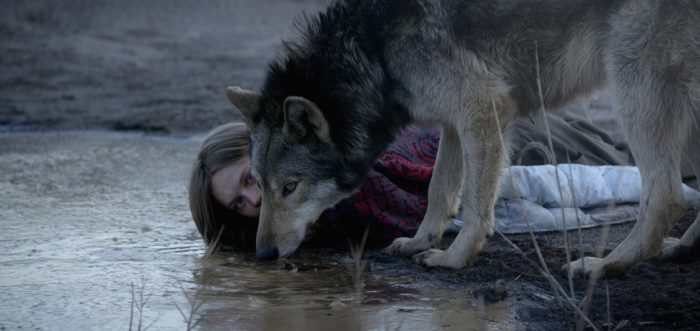
One of Freud’s most famous case histories was that of the patient he called the Wolf Man. The man was given the name on account of a dream he had as a child, where a handful of white wolves appeared outside his bedroom window. In his analysis of the dream, Freud posited that at a very early age the man had witnessed a “primal scene”, one in which his parents were having sex from behind, hence the vision of wolves; an animal that copulates in this fashion. Unsurprisingly, in Freud’s hands, the image of the wolf becomes laden with sexual connotation. In her new film Wild, actor turned director Nicolette Krebitz takes these connotations to another level, where the sexual symbolism of the wolf is rendered far more literal.
Wild tells the story of Ania (Lilith Stangenberg), a young woman who lives a depressing life in an eternally overcast city in central-eastern Germany. She works an uninspiring tech job by day, and sleeps alone in a drab apartment block by night. Her only human contact outside of the office consists of Skype calls to her sister, and visits to her hospitalised grandfather. While walking past a stretch of parkland on her way to work one day, Ania comes face to face with a rogue wolf. It proves to be a life-changing encounter that awakens a kind of species dysphoria in Ania, triggering a process of transformation in which she eventually rejects human society, and moves toward the world of the wolf. Turning the tables on a Red Riding Hood narrative, Ania eventually catches the wolf and locks it up in her apartment. The pair eventually begin to trust one another, and proceed to form a disconcertingly intimate relationship.
It is possible to interpret Ania as a woman on the edge, her journey comparable to that of Catherine Deneuve’s character in Roman Polanski’s Repulsion. The drawback of such a comparison is that it positions Ania’s trajectory as one of descent, either into madness or animality, whereas in the film it actually feels like something much more positive, and more akin to a process of liberation or empowerment. While conveying this sense of positivity, Krebitz thankfully avoids a pat narrative where a return to nature offers a purification or renewal for her protagonist. At worst, Wild could perhaps be charged with a kind of eco-feminist essentialism, in which women are seen as closer to nature and to animals, but for the most part the film’s narrative is very refreshing.
Ania’s transformation also assumes the form of a romance. Her relationship with the wolf is taken to great lengths by Krebitz, and in a manner that will presumably turn many viewers away from the film outright. While their relationship is not consummated in the traditional sense of the word, there are certainly several sequences that have the potential to ignite controversy. The most notable scene is a dream sequence with an emphasis on oral pleasure, offering a new and feminist imagining of the phrase “doggy-style”, but Krebitz seems well aware of the potential awkwardness of these themes for her viewers, and makes some of the sequences more palatable by approaching them with a sense of humour. For instance, she pokes fun at the idea of conventional filmic romance in her depiction of the night Ania and the wolf spend together — Ania’s sexual crescendo coincides with a clichéd ballad, and is followed by a morning-after scene in which she plays the besotted lover, making breakfast eggs for the wolf.
This is not to suggest that Wild is only played for laughs; while there are a lot of funny moments, Ania’s journey is taken quite seriously. The film presents a mix of the genuine, the comedic and the erotic that makes it weird, but not ineffective, as these different elements all hang together rather well. Wild is, however, let down by its pacing, which detracts a little from Ania’s otherwise compelling transition. Krebitz spends overlong periods establishing the parameters of her protagonist’s life at early stages of the film, so it takes a very long time before Ania interacts with the wolf. After this drawn out introduction, the trust that emerges between her and the animal feels far too rapid in its development – the wolf more or less transitions from snarling predator to obliging cohabitant within the space of a single scene.
Wild will also be of interest to those compelled by the visceral pleasures of cinema, as it ranges from the deeply sensual, to the more nauseating effects of the gross-out film. Some viewers will be repulsed by the physical nature of Ania’s transition (the instances when she begins to share in the wolf’s feeding habits will surely turn some stomachs), but the success of most of these moments, and the fact that they often serve a greater purpose than merely that of shock, has a lot to do with the indomitable Lilith Stangenberg. She inhabits the strangeness of Ania brilliantly, and seems to revel in the physicality of this highly unconventional role.
Although a common phrase like “animal desire” points to the ingrained association between animals and sex, sexual acts that actually cross the species line are still very much a taboo subject. What makes Krebitz’s conception of the theme particularly transgressive is the fact that Ania’s actions are, at least on her side, both loving and consensual, but whether this is also true of the wolf is much more uncertain. Wild does not lead the viewer to conceive of bestiality in the way convention would demand; as something degrading or perverse. Regardless of one’s response to the film, it would be difficult to deny that Krebitz has produced something quite new and subversive.
Around the Staff
| Conor Bateman | |
| Ian Barr |
